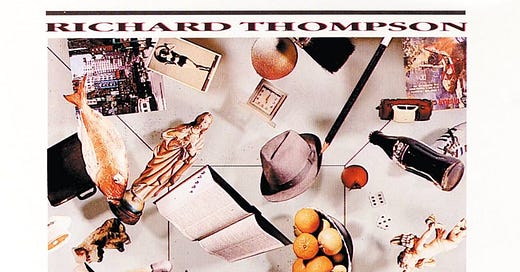The 1985 Project Part 13 - Richard Thompson - Across a Crowded Room
If you know me at all, you know I'm gonna like this one
I’ve been looking at albums from 1985, starting with the 40 which were cited in that year’s Village Voice Pazz and Jop Poll with the intention of covering a lot of other records when I finish this part.
I didn’t remember this album placing as high as 13th in the Pazz and Jop Poll that year. It and it’s follow-up Daring Adventures have become virtually forgotten by all but the most hard-core RT fans. Polydor Records gave a big push to Across a Crowded Room, and as a result, used record stores used to be flooded with promo copies. In fact, there are still multiple copies sitting around at the store where I work. It’s that hard to sell.
But if you like Richard Thompson at all, you should love this album. I always tell people that if they don’t know his music, they need to start with the two best, both with his then-wife Linda – Shoot Out the Lights and I Want to See the Bright Lights Tonight. After those, you can pick up practically any record he made before 1992 and be very happy. The ones after that are still mostly good to excellent, but they are missing some of the sparks that made the older ones better.
One of those missing sparks was the high quality of musicians Thompson could call on in the 70s and 80s. This album includes his former Fairport Convention cohorts Simon Nicol on rhythm guitar and the incomparable Dave Mattacks on drums. It also is the first to have the duo of Christine Collister and Clive Gregson on backing vocals – Gregson had been on the previous Hand of Kindness but this introduced Collister. These four would be frequent flyers in his bands of the late 80s, which were among the strongest live acts I ever saw.
Songs on Across the Crowded Room are strong. “When the Spell Is Broken” is sharp enough to have fit on Shoot Out the Lights, though perhaps its end-of-a-love affair theme is spelled out a bit more blatantly than on some of the earlier songs. “You Still Care” is built on a fantastic almost New Wave guitar figure and a catchy melody sung by Collister and Gregson and someone named Phil Barnes set against Thompson’s sardonic chorus of belief that the woman he hurt still loves him. “I Ain’t Going to Drag My Feet No More” is a stentorian march that somehow sounds light as a feather. “Love in a Faithless Country” is one of those slow numbers Thompson loves to offer, giving him a chance to really shine on guitar. (Of course, Thompson shines on guitar every time he picks one up; it’s practically impossible for him to play something that isn’t stunning.)
“Fire in the Engine Room” and “Little Blue Number” are the kind of helter skelter pell mell speed exercises that Thompson used to put on most of his records. They tend to be crowd pleasers, giving people a chance to dance madly and sing along when he plays them in concert. Except that I don’t remember him playing either of these in decades. “Walking Through a Wasted Land” gives Thompson a chance to complain about the ways modern life is destroying old ways, and is probably the weakest song here. “She Twists the Knife Again” is one of his strongest melodies, with lyrics intended to be funny about the ways a man puts up with pain from his romantic partner but which don’t quite work as well as they should. Still, the performance is so powerful that I never get tired of it. The album ends with an even slower, quieter, moodier song, “Ghosts in the Wind.”
I had discovered Thompson only a couple years before this album appeared. It didn’t take me long to declare he was the greatest guitar player in the world, and to put him in my personal pantheon of greatest musicians alive. I think I saw him do a solo show sometime before this album came out, and I almost certainly traveled to Chicago to see him tour behind this record. Since then I’ve seen him at least a dozen times. I admit to being a mite biased in his favor, but he’s never given me a reason to be disappointed in his music.
So, how to grade this one? I like it more than most records in 1985, but I also have to compare it to Thompson’s better albums. So, I guess I’ll be conservative and call it 8.5 points out of 10.



